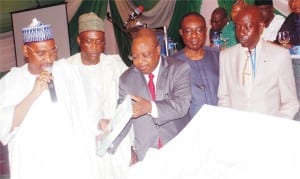Business
Deregulation, Best Option For Nigeria’s Economic Dev
The Major Oil Marketers Association of Nigeria (MOMAN) has said that deregulation of the downstream sector of the oil and gas industry remains the best option to move the economy forward.
The Executive Secretary of MOMAN, MrObafemiOlawore, made the assertion in an interview with newsmen in Lagos on Monday.
Olawore said that deregulation would bring in investments into the sector, adding that only deregulation would encourage the establishment of private refineries in the country.
According to him, the Federal Government should summon the courage to fully deregulate and remove subsidy or embark on continuous subsidy regime payment as at when due.
“If government likes, they can introduce gradual removal of subsidy but it should not go beyond 6 to 18 months period.
“If fully deregulated with rules, you will have the serious investors coming in to invest adequately,” Olawore said.
According to him, deregulation is the answer and the government must talk to the people and let them understand the advantages.
“The governemnt must also show that in the areas where there have deregulation, people are gaining and that whatever comes in as funds will be used for the benefit of the people.
“People should know that the subsidy refund is not dash money. It is what you have paid for and somebody is paying you back because you have been told to sell below the market price.
“We were hoping that we will be paid back on time but the refund is delayed infinitely. Banks are on us demanding for their money and interest,” he said.
The executive secretary also said that the foreign exchange element affected the business.
“When you buy a product at 160 to 1 dollar, for instance, and you don’t get the money until the exchange rate has been raised to 240, it means that you incur a huge loss. Who bears that?
He said that there was need for government to pay as at when due for marketers to underscore the need for a hedge fund that would enable importers to cover such losses.
“There is no hedge fund that will give us protection for one year because increases come up, so many feel that once there is a hiccup it will lead to increase in price,’’ he said.
Olawore said that passage of the Petroleum Industry Bill (PIB) remained the best options that would usher in deregulation, adding that even if the current PIB was not perfect, it could be amended after the passage.
“Once you deregulate, these refineries will be coming up. So, we will plead that we get the National Assembly to pass the PIB.
“We believe that the PIB will go a long way in encouraging deregulation but if we want a PIB that will be faultless before it will be passed, then we are thinking that we are not human beings.
“ Why do we have the word amendment? How many amendments have they done on the American constitution?
“American constitution has experienced so many amendments. It is better to pass it and as we go ahead, if there is any need for amendment, we make it,” he said.

L-R: Accountant-General of the Federation, Mr Jonah Otunla; Representative of the Vice President, Amb. Bashir Yuguda; Head of the Civil Service of the Federation, Mr Danladi Kifasi; Permanent Secretary, Ministry of Land and Urban Development, Mr George Ossi and Auditor-General of the Federation, Mr Samuel Ukura, during the Launch of Accrual Accounting Manual, International Public Sector Accounting Standards Compliant In Nigeria (IPSAS) in Abuja on Monday.
Business
Tinubu’s RHI Doles Out N50m To 1,000 Kwara Petty Traders

Business
UBA To Educate SMEs, Business Owners On Withholding Tax

Business
Nigeria Losing $40b Annually From Maritime Sector – NIMENA
-

 Featured4 days ago
Featured4 days agoI Won’t Allow Spoils Of Office To Change Me – Fubara …As Rivers People Mark Gov’s 50th Birthday With Prayers
-
Business4 days ago
Nigeria Losing $40b Annually From Maritime Sector – NIMENA
-
Business4 days ago
Expert identifies UNICEEF’s NLP As Spring Board To AI In Benue
-

 Niger Delta4 days ago
Niger Delta4 days agoCommissioner Hails RSHA Speaker Over Promise Of Constituency Projects To Ogu/Bolo
-
Politics4 days ago
Presidency, APC React As El-Rufai Criticises Party, Urges United Opposition
-

 Niger Delta4 days ago
Niger Delta4 days agoNDDC’s Performance, Boost To Tinubu’s Government – Coalition
-
Politics4 days ago
Same Faith Ticket, CAN Yet To Decide For 2027
-

 Business4 days ago
Business4 days agoUBA To Educate SMEs, Business Owners On Withholding Tax

